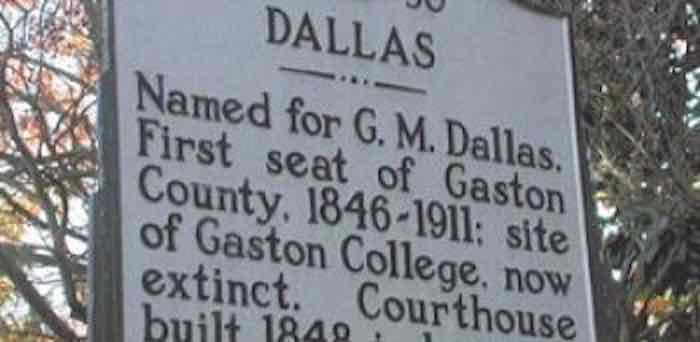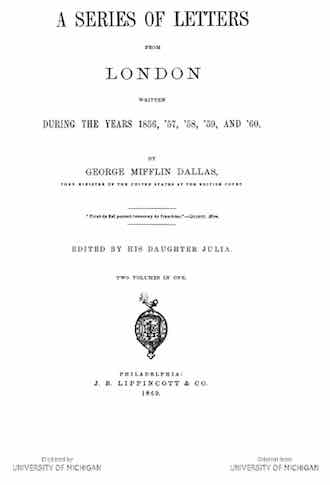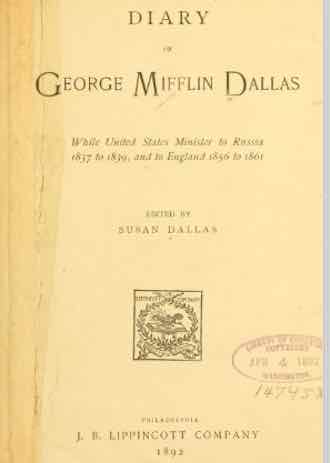By Lee Cary ——Bio and Archives--September 11, 2017
American Politics, News | CFP Comments | Reader Friendly | Subscribe | Email Us

"Though Dallas was...personally acceptable to his English hosts, he was regarded as the representative of an administration that favored slavery, a practice that had become abominable to most Britishers. The British press in 1856 had heralded the new Republican Party as a group dedicated to antislavery and had been disappointed by the Democrat victory. Although from Pennsylvania, a free state, Dallas was a thorough Democrat, one quick to take offense at English 'bigotry against black slavery.' " (pp. 428-429)Dallas' noted quickness "to take offense" may be reflected in his July 24, 1860 Diary entry.
"[M]y individual opinion as to the races being unequal in intellect is strong, but the point has never been studied, and could not be handled in the slightest manner without exhibiting weakness." (p. 410)Tensions between Dallas and a British nobleman, Lord Brougham, surfaced on July 16, 1860, at Somerset House, London, in what would become a brief diplomatic dust-up. Brougham's hatred for slavery drove him to provoke Dallas, before a gathering of esteemed gentlemen, by announcing to the crowd, "I call to the attention of Mr. Dallas the fact there is a Negro present, and I hope he will feel no scruples on that account." The "Negro present" was Martin Delany--an abolitionist, physician, journalist and writer. Dallas: The Series Part 1: Will Dallas join the 2017 Great Purge of American History? Part 2: Who was George Mifflin Dallas in American History? Part 3: Life of George Mifflin Dallas, Vice President of the United States Part 4: City of Dallas is named after a Democrat Party politician whose support for the Fugitive Slave Act Part 5: Dallas praised Pennsylvania's denunciation of slavery in 1835 Part 6: Will Dallas join the 2017 Great Purge of American History? (Part 6)
"In April 1858, a series of seizures occurred in the Caribbean Sea by the Royal Navy that brought the United State and Great Britain to the brink of war. Dallas took action by filing a series of protests with the British foreign Office in May 1858. In June 1858, the British Foreign Secretary Malmesbury agreed that the British actions were a violation of the 1842 treaty, and vowed to discontinue the practice--mostly because of pressure from commercial classes in Britain who wanted to avoid a conflict with the United States. The Dallas-Malmesbury Memorandum, in effect, strengthened the American doctrine of freedom of the seas." (Source, p. 181)
Support Canada Free Press

"Allow me to comment...respecting the Supreme Court's decision in the case of Dred Scott, by adding that if we do not, in some authentic form, let this prejudiced portion of the world [Britain] have access to the whole truth, it is a hundred to one that the dissenting opinions of Judges McLean and Curtis will be represented and almost universally received as the Judgment. As to obtaining from the Press here, or anywhere in Europe, a fair and impartial exposition of the relation of slavery to our national constitution, so as to vindicate the principles and practice of our national democracy, no hope can be conceived more chimerical." (p. 151, italics in original)In part, Supreme Court Justice John McLean's dissenting opinion claimed there was no basis to assert that blacks could not vote, since, at the time of the Constitution's ratification, five of the thirteen states allowed blacks to vote. Consequently, that made them citizens both of their respective states and the United States. He described the claim that Scott was not a citizen as "more a matter of taste than law." Supreme Court Justice Benjamin Robbins Curtis' dissent included his assertion that the court had no jurisdiction to hear Scott's case because it had stated he was not a U.S. citizen; therefore, the case should be dismissed.
 Dallas clearly had distain for the author and her book, likening her to a traitor.
In his letter to William M. Marcy dated November 7, 1856, he wrote this of Stowe:
Dallas clearly had distain for the author and her book, likening her to a traitor.
In his letter to William M. Marcy dated November 7, 1856, he wrote this of Stowe:
"Judging by the pertinacity with which she applies her talents to undermine the constitution and degrade the character of her country, she is far worthier of repudiation and banishment than ever was [Benedict] Arnold or [Aaron] Burr. Genius does not always choose patriotism for a companion." (Source, p. 429)A Dallas letter from London dated November, 11, 1859, to Secretary of State Lewis Cass, referred to John Brown's Raid on Harpers Ferry in October 16-18 of that year. The mentioning of "Ossowatomie Brown" below probably alludes to an event on August 30, 1856, when about three hundred Missourians advanced toward Osawatomie, Kansas to kill Free State settlers. That morning they killed Brown's son, Frederick, outside of Osawatomie.
"The foray of Ossowatomie Brown and his band has been condemned upon here [in London] with a little less of the anti-slavery monomania than usual. The favorite cant ascribes it to 'madness.' To me there seems so much method in this madness that I cannot but regard the whole as meriting a thorough investigation by commission or committee. Our national future may depend upon the manner in which this plot is dissected and exhibited. To pass it over as a freak will ensure it many imitations. Besides, the conduct of those who were to be forced into liberty, willy-nilly, goes an immense way to shew {sic} the real character of their [the slaves] condition as laborers:--and at the same time may satisfy the most fanatic abolitionist how utterly nonsensical as well as desperate is the object at which he aims." (p. 168, italics in original)In an August 12, 1856, letter to "Col. Page" from London, Dallas laments the "dissolving" influence of the abolitionists.
"To myself individually it matters little whether the Union be saved or subverted...but it is natural to look somewhat after the happiness of one's children, and of the friends of well-organized liberty throughout the world. I pray and beseech all who care a fig about my opinion, to struggle for the preservation of the Union against the 'dissolving view' of Eastern and Anglican abolitionists, until their tongues can no longer wag." (p. 74)

 In his diary entry for December 3, 1860, Dallas placed partial blame on the "Garrisonian Radicals" for the "political storm raging in the South." His language refers to William Lloyd Garrison, an outspoken, abolitionist reformer, and well-known editor of the anti-slavery newspaper, The Liberator.
In his diary entry for December 3, 1860, Dallas placed partial blame on the "Garrisonian Radicals" for the "political storm raging in the South." His language refers to William Lloyd Garrison, an outspoken, abolitionist reformer, and well-known editor of the anti-slavery newspaper, The Liberator.
"The news brought by the steamer from America is exciting. The political storm rages fiercely in the South, taking a reckless direction for secession, and produces a financial panic which cannot pass away without effecting a widespread ruin. The successful Republican party at the Presidential election are striving to appease and propitiate, but having, during the canvass, taken the 'irrepressible conflict' ground, and having had the aid of the Garrisonian Radicals, who denounce the Constitution as a 'League with hell,' it seems natural that the South should regard their defeat as involving a destruction of their property and rights. If I could perceive among the leading men in the agitation of the South any staid, judicious statesmen, I should think the Union lost. I see only such uniformly violent, effervescing, and unsuccessful ranters....and I conclude that the local movements will yet be settled by the ballast near the keelson of the ship."Dallas saw war ahead, and it saddened him.
"1861. May 1. The President's Proclamation against the seceding States as insurrectionary follows quickly upon the fall of Fort Sumter, and firmly accepts the challenge of war involved in that belligerent attack. It calls out seventyfive thousand militia, and will no doubt be enthusiastically responded to in men and money. Thus, then, has sectional hatred achieved its usual consummation, civil war! Virginia hesitates, but she will join the Confederacy, as will also, finally, Kentucky, North Carolina, Tennessee, and Maryland. My poor country can hence forward know no security or peace until the passions of the two factions have covered her hills and valleys with blood and exhausted the strength of an entire generation of her sons. All Europe is watching with amazement this terrible tragedy."Much of America is watching with amazement the 2017 Great Purge of American History. A decision to remove Dallas' Confederate monuments, but not change the city's name, would illustrate historical ignorance, or political hypocrisy...or, maybe both.
View Comments